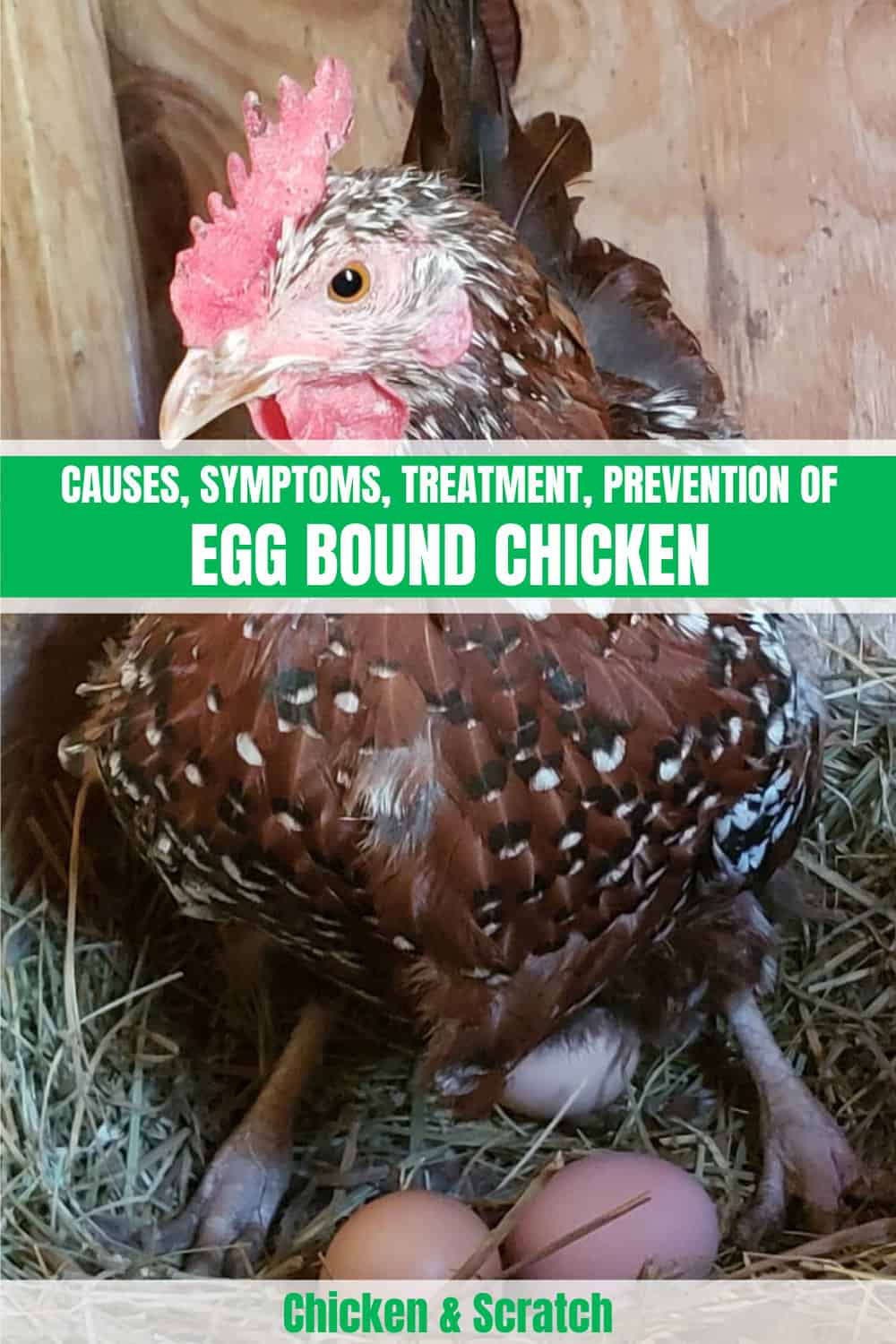Having an egg bound chicken can quickly turn into a serious issue that threatens the life of one of your prized hens. Fortunately, with proper care and intervention, an egg bound chicken can continue on with a healthy, productive life consisting of plenty of egg-laying.
Spotting the symptoms of an egg bound chicken is much easier if you know what you’re looking for. In this article, we’ll take a close look at what having an egg bound chicken means. Then we’ll show you how to treat a hen suffering from being egg bound.
What Is an Egg Bound Chicken?
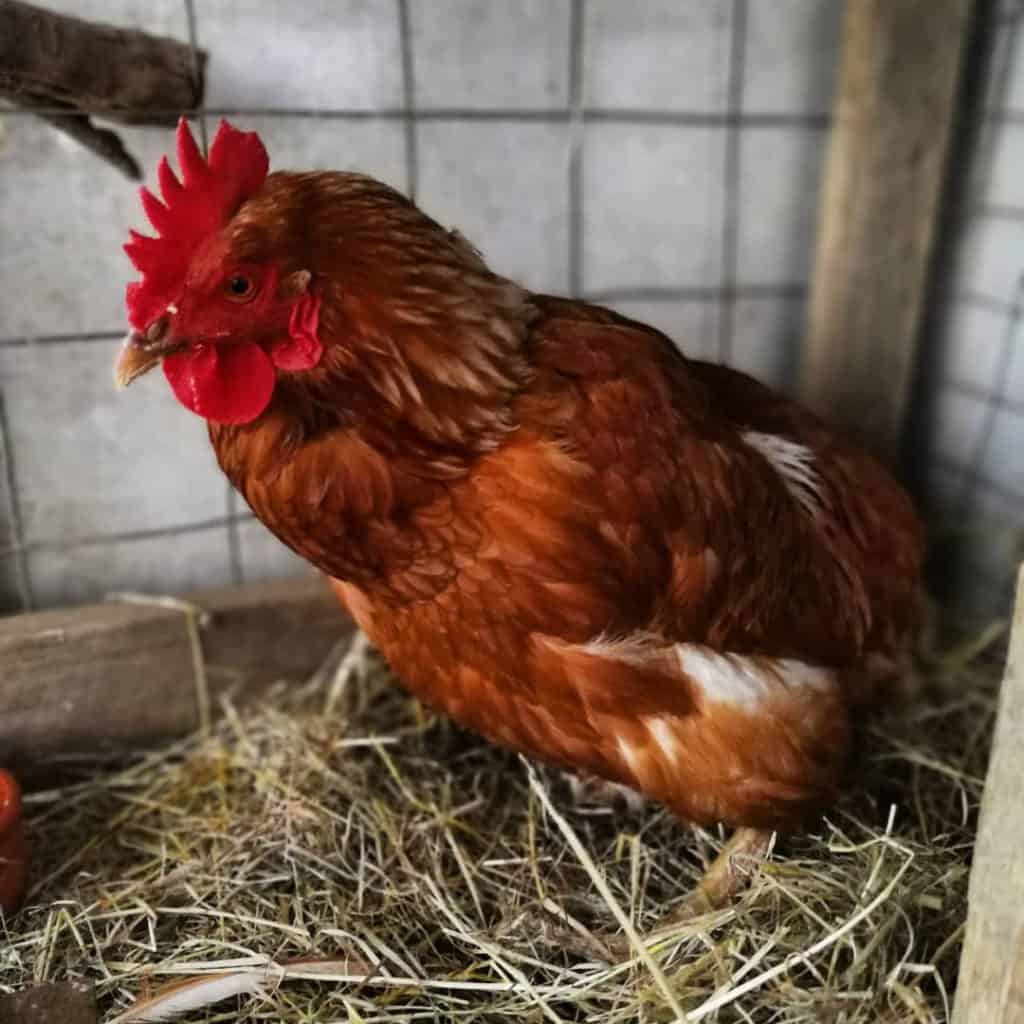
The term “egg bound” sounds rather harmless. But in reality, it’s an emergency for a hen. Without immediate intervention, the hen could develop serious complications and potentially die.
The be egg bound means that the hen has an egg that’s lodged somewhere within her oviduct. The most common place is directly between the uterus and cloaca. There are times where you can’t visually see the bound egg from the hen’s cloaca/vent.
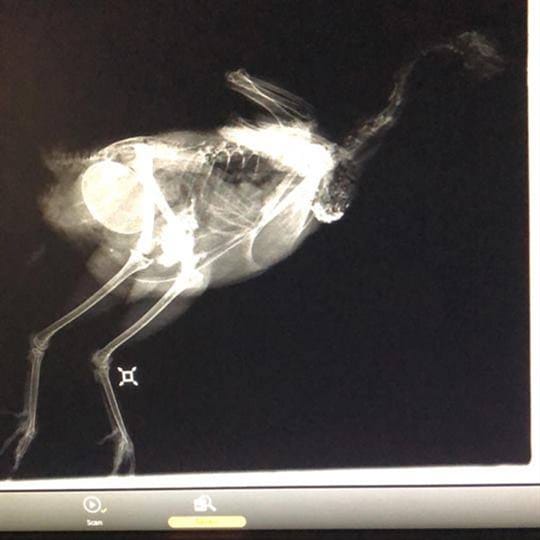
When the hen is ready to pass an egg, the cloaca seals itself shut so that the eggs won’t be covered in feces. With this now permanently sealed shut due to egg binding, your hen won’t be able to excrete fecal matter. If they’re not able to perform this function within 24 – 48 hours, the hen will most likely die.
Another effect of egg binding is vent prolapse. This is when the hen’s vent hangs out of the canal. In cases that are severe and untreated, this leads to egg yolk peritonitis which can kill your hen very quickly with its infection.
The Causes of Egg Binding
Unfortunately, there is quite a wide variety of culprits that lead to egg bound chicken. Some causes are very manageable. Others aren’t manageable at all.
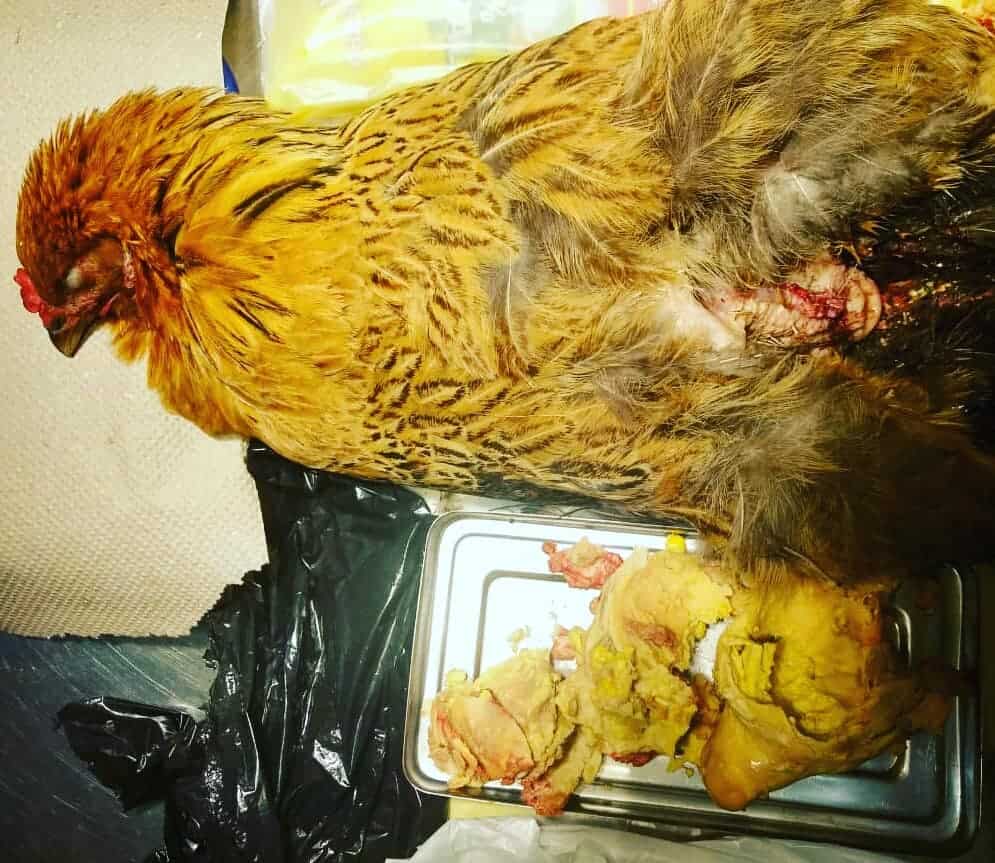
Here are some examples:
- Passing very large or oddly-shaped eggs
- Production system malfunction
- Eggs with two yolks that are larger than their usual eggs
- Poor quality of diet without necessary proteins, vitamins and minerals
- Obesity or laziness
- Frequent premature egg-laying
- Elderly chickens with weaker muscles due to less activity
- Insufficient room in nest boxes, causing a hen to “hold” an egg until more room is available
- Reproductive tract infections
- Internal parasites
You can clearly spot the ones that are completely preventable with good nutrition and proper attention to the welfare of your hens.
Symptoms of an Egg Bound Chicken
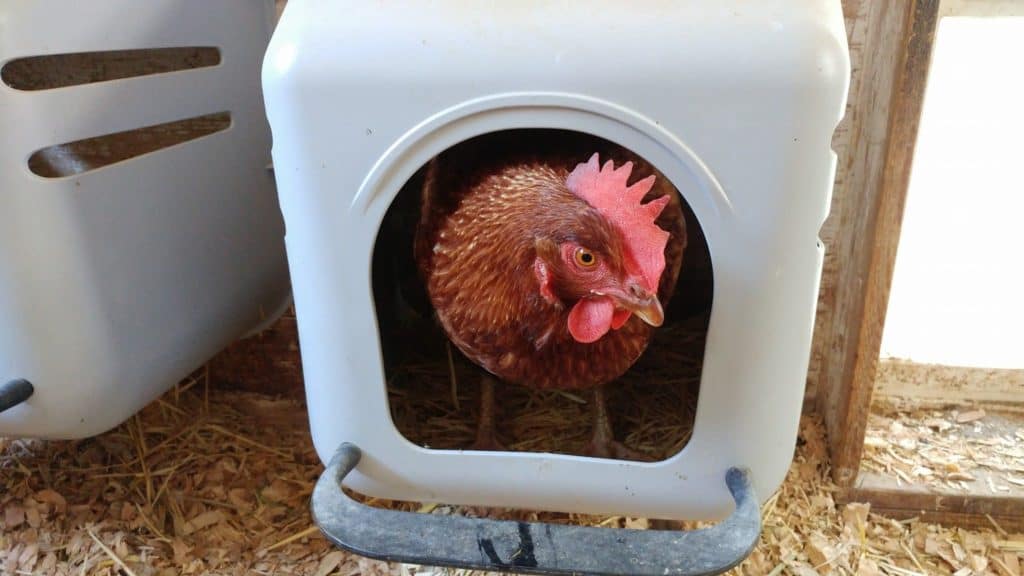
Are you able to instantly notice an egg bound chicken? If you’re honest with yourself, your answer is probably no. Our prized hens are very secretive about illness or problems they’re having. If the hen is able to pass the bound egg without any help, chances are you probably never realized there was a problem.
Here are some common symptoms to keep an eye out for:
- A decrease in appetite and drinking
- Sitting around a lot, lethargic and fluffed up
- Acts depressed or looks like something is wrong
- Wings are shaky
- She’ll walk like a penguin or stop walking periodically and attempt to squat
- Visible straining of the abdominal
- Tail pumps up and down repeatedly for an extended period of time
Most sick chickens sit off by themselves in a quiet area when they’re not feeling well. So the first three symptoms listed can apply to any sick chicken.
The most tell-tale signs of an egg bound chicken are the tail pumping and penguin-like walk. When you see either one of these, it’s a good indication of a binding problem.
Keep in mind, however, that these can also indicate that your hen is constipated.
Treatment for Egg Bound Chickens
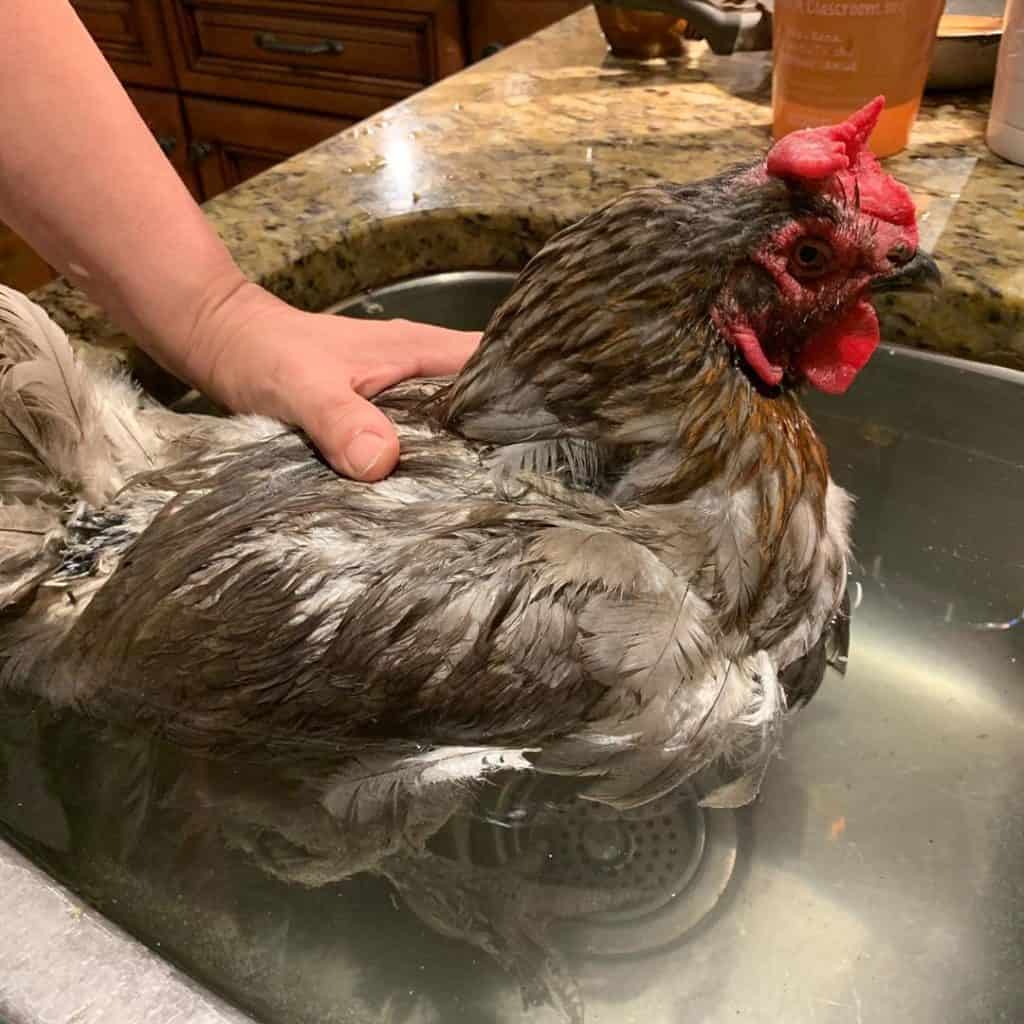
First, do you know for sure that the hen is egg bound? To find out, use some KY jelly and a sturdy latex glove. Insert your finger very gently inside her vent. Slowly press your finger directly back approximately two inches. At this point, you should be able to feel the bound egg.
If you don’t feel an egg two inches inside the vent, you don’t have an egg bound chicken.
If you do feel an egg, it’s time to act. Prepare your hen a warm bath with some Epsom salts. You’ll want one cup of salts for every one gallon of warm water. Make sure the bath is deep enough so that your hen can sit in a depth of three or four inches.
Before putting your hen into the bath, give her calcium. The Tums in your cabinet or a calcium pill will suffice. Just make sure you grind it down to a powder or break it up into tiny pieces so she is able to swallow.
The added calcium in her system improves her strength and gives more powerful contractions to help pass the egg.
Now it’s time to gently direct her into the warm water. She’ll probably struggle initially but will typically settle in before you know it. The warm bath must feel really good.
Make sure you’re able to keep her in the bath for at least 15 – 20 minutes.
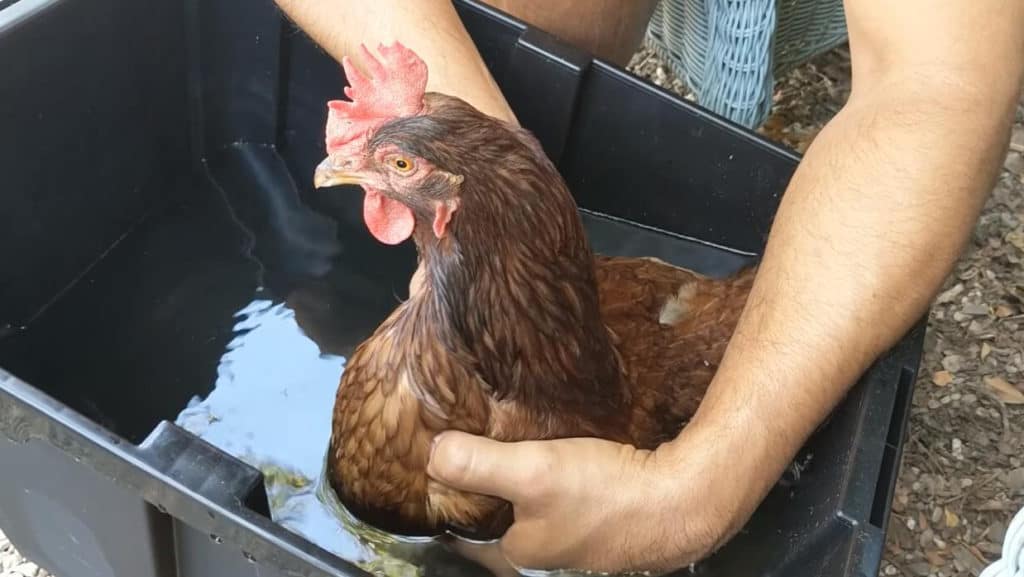
When it’s time to remove her from her spa treatment, towel-dry her and use a hair dryer on the low setting (if she is able to tolerate it) to thoroughly dry her off.
Then, apply Vaseline, KY Jelly or perhaps a little vegetable oil to her vent. Some people say that giving her a gentle abdomen massage helps this process. You can do this for about ten minutes.
Focus the message by going from the front to the back, attempting to stimulate a contraction. Keep in mind that she has an egg stuck inside of her. Massage with kid gloves to avoid breaking the egg inside the hen. That’s not an issue you want to deal with.
After the treatment is complete, put the hen inside of a darkened crate, with water to drink and some food. If her vent area is noticeably swollen, apply a little Preparation H to reduce swelling.
In some cases, you’ll need to repeat this treatment three-four times more over the course of the next few hours in your want to get the egg moved out naturally.
What Happens If She Can’t Pass the Bound Egg?
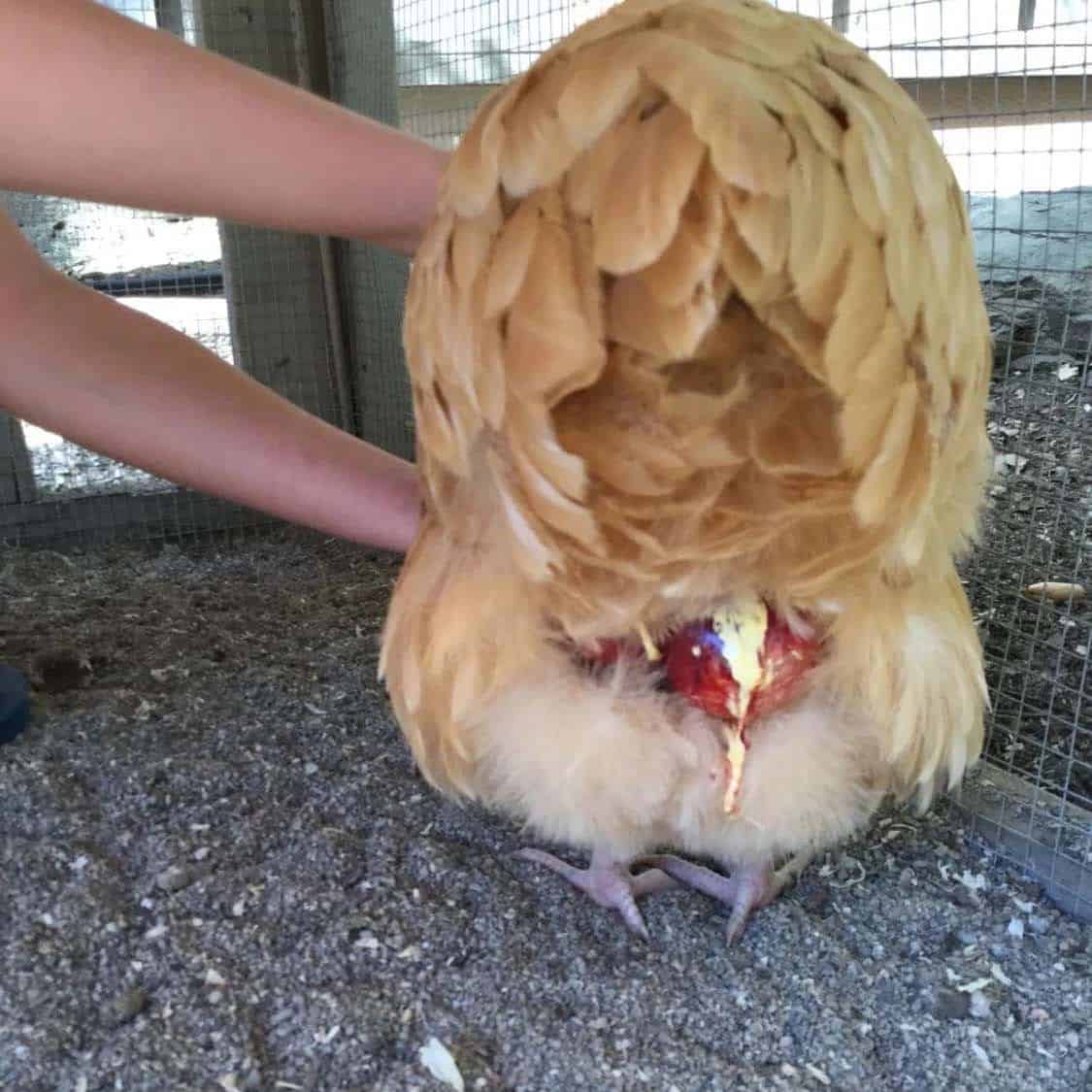
If this step didn’t help your hen pass the bound egg, your options for treatment get a little narrower.
If you can afford it, it’s best to seek out a qualified veterinarian at this time. The only other alternative is to remove the egg on your own. This can quickly become dangerous for your hen.
Consider your bound egg removal as an absolute last resort when you have an egg bound chicken. It’s not advisable to perform this procedure unless you’re left with no other options.
Here’s how it’s done:
If you’re able to visually see the egg inside of the hen’s vent, gently make a hole in the egg big enough to suck out the egg’s contents with a syringe. Never use a needle.
After you’ve syringed out the contents of the egg, pull gently on the shell. Your goal is to remove it while it’s still intact. If the shell does break, make sure that you remove all of the pieces.
If you’re able to feel the egg but can’t see it, lubricate her vent and cloaca and attempt manual manipulation. This will sometimes move the egg. Other times, it might break.
For a broken egg, you’ll need to remove every piece of the shell. A shell piece left inside of her will cause cuts and leave your hen susceptible to infection.
Once you’ve removed the shell successfully, put your hen into a darkened crate for several hours. Keep an eye out on her to see when she starts drinking and eating again.
If the egg did break inside of the hen, it’s a good idea to give her infection-preventing antibiotics from your veterinarian.
Preventing Hens From Egg Binding
As discussed above, many causes of egg bound chickens are completely preventable. These include:
- Premature laying – don’t use tactics that attempt to get hens to lay sooner than they naturally would
- Proper diet – it’s best to buy ready-made feed for your chickens. Also, provide a calcium feeder so your hens can regulate their calcium intake
- Proper nest boxes – provide one box for every three of your hens
- Obese and sedentary hens – encourage more activity. Avoid extra treats or leftovers from people
- Elderly hens – older hens will naturally be more infrequent layers. Carefully monitor their health as they get older
- Infestation problems – if you’re suspecting a worm infestation, take a fecal sample in to your veterinarian’s office
These are the best steps you can make to help prevent problems with egg bound chicken.
Dealing with an Egg Bound Chicken
An egg bound chicken is actually a pretty rare occurrence. Although they do seem to a bit more prevalent due to backyard hens living longer than commercial hens.
We truly hope you never have to deal with an egg bound chicken. But if you ever do, now you know exactly what needs to be done.

Joseph Hudson has been raising chickens for over 15 years. In 2018, he completed the Agriculture & Natural Resources program at Mt. San Antonio College. He currently raises over 1400 chickens on his 7.5-hectare farm. He keeps sharing his experience on raising healthy and happy chickens on Chicken Scratch The Foundry.
